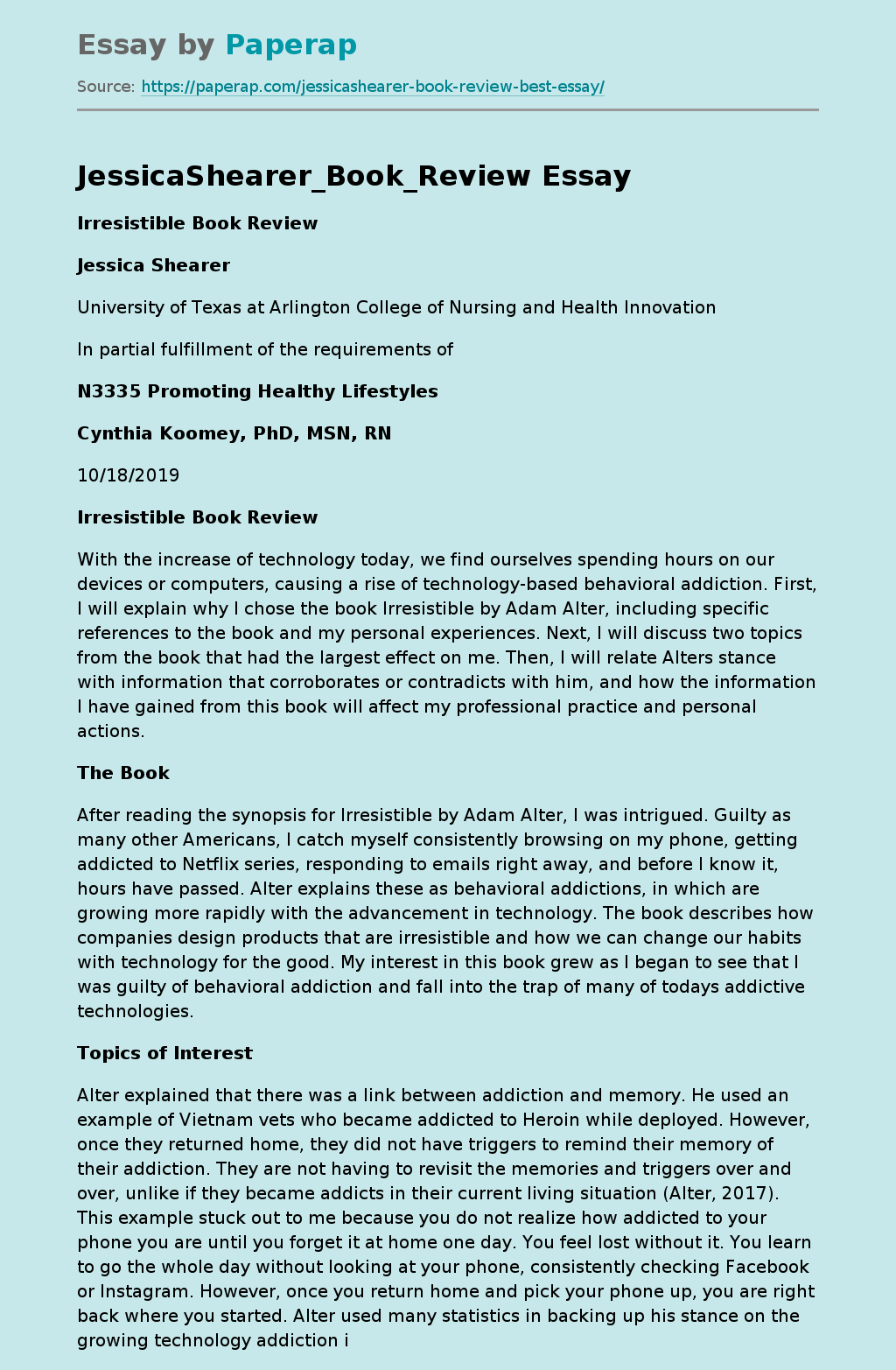JessicaShearer_Book_Review
Irresistible Book Review
Jessica Shearer
University of Texas at Arlington College of Nursing and Health Innovation
In partial fulfillment of the requirements of
N3335 Promoting Healthy Lifestyles
Cynthia Koomey, PhD, MSN, RN
10/18/2019
Irresistible Book Review
With the increase of technology today, we find ourselves spending hours on our devices or computers, causing a rise of technology-based behavioral addiction. First, I will explain why I chose the book Irresistible by Adam Alter, including specific references to the book and my personal experiences.
Next, I will discuss two topics from the book that had the largest effect on me. Then, I will relate Alters stance with information that corroborates or contradicts with him, and how the information I have gained from this book will affect my professional practice and personal actions.
The Book
After reading the synopsis for Irresistible by Adam Alter, I was intrigued. Guilty as many other Americans, I catch myself consistently browsing on my phone, getting addicted to Netflix series, responding to emails right away, and before I know it, hours have passed.
Alter explains these as behavioral addictions, in which are growing more rapidly with the advancement in technology. The book describes how companies design products that are irresistible and how we can change our habits with technology for the good. My interest in this book grew as I began to see that I was guilty of behavioral addiction and fall into the trap of many of todays addictive technologies.
Topics of Interest
Alter explained that there was a link between addiction and memory.
He used an example of Vietnam vets who became addicted to Heroin while deployed. However, once they returned home, they did not have triggers to remind their memory of their addiction. They are not having to revisit the memories and triggers over and over, unlike if they became addicts in their current living situation (Alter, 2017). This example stuck out to me because you do not realize how addicted to your phone you are until you forget it at home one day. You feel lost without it. You learn to go the whole day without looking at your phone, consistently checking Facebook or Instagram. However, once you return home and pick your phone up, you are right back where you started. Alter used many statistics in backing up his stance on the growing technology addiction in society. The most eye opening to me was learning that up to 40 percent of the population have a internet-based addiction of some form. Beyond this addiction, Alter explained that 46 percent of people are unable to be without their phones, and 80 percent of young adults look at their phones at least one time in an hour (Alter, 2017). These findings made me think, am I included in those addicted and realize that I am guilty of checking my phone constantly, and I would feel lost if I forgot my phone at home. I realized how serious this addiction to our smartphones is becoming after placing myself in the same scenarios.
Corroboration/Contradiction
Alter explained that consequently to technological addictions, we are missing out on our lives and how we communicate. Sadly, many teenagers would rather play video games or be on their phones that they are lacking social interaction. One study Alter mentioned showed that students described their interactions with the internet as having negative consequences in their work, relationship, and family lives because they are spending too much time on the internet (Alter, 2017). According to Murphy (2016), technology has many physical strains on our body. It can cause a more sedentary lifestyle the longer we sit in front of a television or video game, sleep deprivation can occur in fear of missing a call or text, and vision problems. There needs to be balance between the use of technology and the time we spend engaging with other people and in other activities.
Alter explained that it is not only a rise in dopamine that creates an addiction, but it is the surrounding events or situation that surrounds the dopamine increase. The substance or behavior itself isnt addictive until we learn to use it as a salve for our psychological troubles (Alter, 2017, p.73). A study by Hawi and Samaha (2019) showed similar findings. In their study of 512 undergraduate students, agreeableness, conscientiousness, openness to experiences, and emotional stability were negatively correlated with problematic internet use (Hawi & Samaha, 2019, p. 110). The more vulnerable or unhappy we are, we search for a trigger that gives us satisfaction. Once that satisfaction is fulfilled, we become addicted the more times we lean on social media or technology to fill the void.
Practice Application
After realizing how addicted I am to my smartphone and technology, I plan on making many changes in my own life. I am going to limit the amount of time spent on my phone and spend more quality time with my family. This will also open more time to become more physically active and focus on my mental health. I will also keep my phone in the living room rather than on my nightstand at night to help increase the quality of sleep I am getting. After making these changes, I should be more rested and able to perform my daily tasks at work more efficiently. Decreasing my phone use and increasing face to face interactions daily will help improve my communication skills and build closer connections with those around me.
References
Alter, A. (2017). Irresistable: The rise of addictive technology and the business of keeping us hooked. New York, NY: Penguin Press.
Hawi, N. & Samaha, M. (2019). Idntifying commonalities and differences in personality characteristics of internet and social media addiction profiles: traits, self-esteem, and self-construal. Behavior & Information Technology, 38(2), 110-119. Retrieved from K. (2016, July/August). Is technology affecting our health? Nursing Made Incredibly Easy, 14(4), 44-53.
JessicaShearer_Book_Review. (2019, Dec 05). Retrieved from https://paperap.com/jessicashearer-book-review-best-essay/

